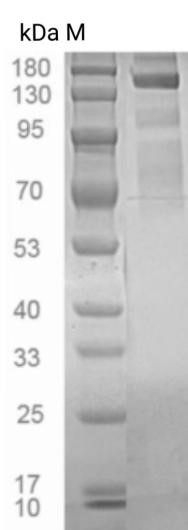Human recombinant poly-IgA (rPoly-IgA) protein (His Tag)
Catalog Number: NP01109
General Information
1. Gene name: IgA1
2. Protein Construction: The gene sequence contains the Fc segment of the IgA1 protein, and the protein N segment contains the histidine tag.
3. Source: Human
4. Expression Host: HEK293 Cells
QC Testing
1. Purity: >95% as determined by SDS-PAGE
2. Endotoxin: <1.0EU per μg of the protein as determined by the LAL method
3. Molecular Mass: Human recombinant polyIgA protein is formed by the polymerization of 4 IgA1 Fc segments and a streptavidin SA, with a calculated molecular weight of 176Kda.
4. Formulation: Lyophilized from sterile PBS, pH 7.4
Usage Guide
1. Stability & Storage:
Samples are transported in ice packs at 4°C.
Samples are stable for 6 months from the date of receipt at -20°C to -80°C. After opening, it is stable for 3 months at -20°C to -80°C.
Recommended to aliquot the protein into smaller amounts for optimal storage.
Avoid repeated freeze-thaw cycles.
2. SDS-PAGE:

Protein Description
IgA is the most abundant immunoglobulin in the mucosal region, but is only the second most common antibody isoform in serum. In the blood, IgA interacts with an Fc receptor called FcαRI, which is expressed on immune effector cells, triggering an inflammatory response. Linking FcαRI via IgA-containing immune complexes causes antibody-dependent cell-mediated cytotoxicity. Human recombinant poly IgA is an analogue of the IgA immune complex, which has similar functions to the IgA complex in the blood, and can bind to FcαRI to induce downstream reactions.
References
Xinfang Xie et al. J Pathol. 2021 Jun. Renal deposition and clearance of recombinant poly-IgA complexes in a model of IgA nephropathy